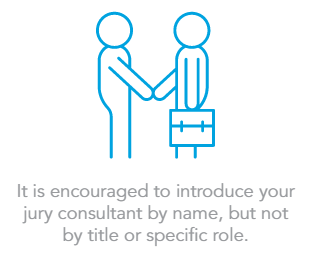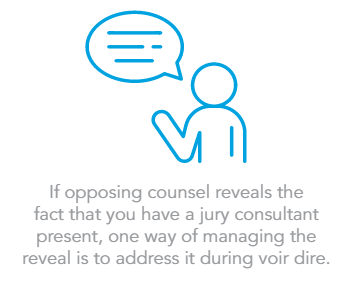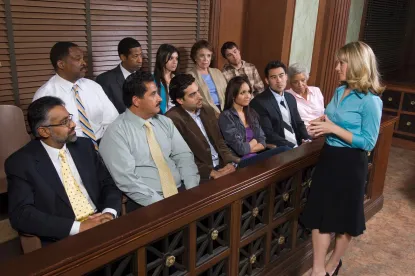Many of our clients are concerned about the perception jurors may have if they learn the attorney has hired a jury consultant to be present during jury selection. After all, most depictions of jury consultants in books, television, and film portray a secretive, intrusive, and often unethical character working to absolve a guilty defendant. While we all know art does not reflect reality in these instances, it is no wonder that most clients would prefer to downplay or deny their consultants’ presence at trial.
So, when the judge asks the parties to introduce themselves, what is the best way to explain the presence of your consultant? Many clients prefer to skip over the consultant entirely, hoping not to draw attention to them. However, there are sound reasons why that may not be the best approach—especially when there are simple and effective ways to conduct the introduction.
Reasons to Introduce Your Consultant in Court
JURORS ARE PAYING ATTENTION
First, just as you are sizing up the jurors, they are doing the same of everyone behind the bar and at the counsel table. They are trying to make sense of this foreign experience, and not introducing your consultant actually draws more attention to them, making jurors speculate as to who that person is, why they may be there, and why the attorney does not want to acknowledge them. Indeed, some jurors may believe the attorney is purposefully hiding something, which may make them doubt your trustworthiness from the outset.
JURORS MAY PERCEIVE OFFENSE
Secondly, jurors may feel that the attorney is being dismissive of the consultant due to their gender, race, age, or some other characteristic. For instance, if your consultant is a female, and the rest of the trial team is male, some jurors may be offended that you have seemingly only introduced your male colleagues while neglecting the female.
IT’S A SMALL WORLD
Although a small possibility, there is always the chance that someone in the venire will recognize your consultant and “out” them as a “psychologist,” which can make jurors feel self-conscious that they are being “analyzed.” (Please note, however, by introducing your consultant, we refer only to providing the name of the consultant; we do not encourage informing jurors of their title or specific role).

As an illustration, I once assisted counsel with a jury selection in New Orleans—a place I have never lived and where I certainly did not expect to be recognized. There were so many lawyers present that my client was sure I would be lost in the sea of faces, and he failed to introduce me to the venire. When the judge asked whether any of the jurors knew or recognized any of the counsel present, one juror stood up and pointed at me, exclaiming, “No, but I know that lady from the mental hospital!”
Indeed, the juror had been transported to the mental health facility in Delaware during the aftermath of Hurricane Katrina, where I was a student intern at the time. While it was not clear to the jurors (and my client) whether I was a patient or caregiver at the hospital, it certainly made for an uncomfortable—albeit somewhat humorous—moment. Thankfully, the judge dealt with it at sidebar.
How to Introduce Your Jury Consultant at Trial
KEEP IT SIMPLE BUT TRUTHFUL
So, how should you introduce your consultant without identifying their role or misrepresenting them as an attorney? It is actually quite simple. I often suggest that my clients merely introduce me as “here to assist during this part of the trial,” or “here to help keep me organized during jury selection.” I have even had counsel tell jurors that I was there “to help keep track of your responses during jury selection.” All of these accurately describe our responsibilities, and jurors are not likely to give it another thought.
ADDRESS “OUTINGS” WITH JURORS
To ensure opposing counsel does not try to take advantage of the fact that your client has hired a “jury consultant” during their voir dire or opening statement, we recommend obtaining a commitment from opposing counsel—in the judge’s presence—to not mention that fact. This strategy has worked successfully in our experience, as trial consultants are more common in court than ever before.

However, if opposing counsel somehow reveals the fact that you have a jury consultant present, there are ways to deal with it that will not make the jurors feel uneasy. This has happened to colleagues and me before, and one way of managing the reveal is to address it during voir dire.
We have successfully put out this “fire” by asking jurors questions such as, “If you were on trial for something that you believe you did not do, how many of you would want to use every resource available to help defend yourself?” and “Is there anyone who believes it is wrong or unfair for a defendant to hire an expert in people and human behavior to help select the most fair and impartial people to serve on their case?”
In Conclusion
While you cannot expect to completely camouflage the jury consultant you have hired for jury selection, the tips we have provided above should help to reduce any awkwardness that may ensue should jurors become suspicious of the consultant’s role in the courtroom. You may be surprised to find that most jurors approve the use of consultants or “jury experts,” and they would want to hire one to help them if they were ever in your client’s position. In actuality, few jurors really believe jury consultants are anything like in the movies.




 />i
/>i

